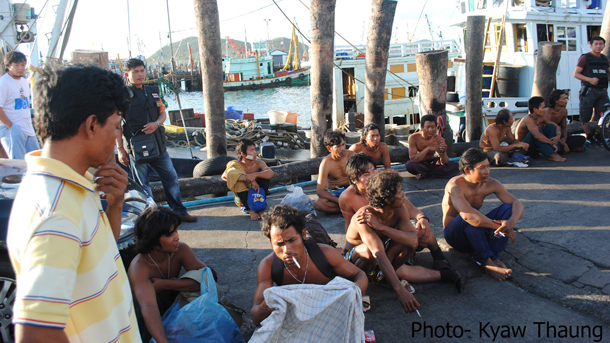Twenty Burmese migrants were rescued when the fishing boat they were forced to work on was raided by the Thai authorities and human rights activists in Chonburi Province, south of Bangkok.
Kyaw Thaung, an spokesperson for the Burmese Association in Thailand (BAT) who was involved in the raid, said that the group was rescued at 3 am on Friday following a tip from one of the victims.
Some of those rescued had been forced to work as “slaves” on the fishing boat for over one year without being paid, he told The Irrawaddy on Monday.
Four people were arrested on the boat during the raid and another two Burmese men were detained later in Bangkok after the authorities followed up on information provided by the victims. Two ethnic Mon women from Burma were among the traffickers arrested on the boat, it has been claimed.
The victims apparently crossed over the Thai-Burmese border near Mae Sot with the assistance of brokers and were then handed to employment brokers in Thailand who arranged for them to join the fishing boat.
Among the 20 were three victims aged just 16 years old and another of around 40 years of age. Many were ethnic Burmese from Pegu Division, while others were ethnic Karen.
“They had to stay like animals, wearing dirty clothes and some people only had one set of clothes. They were locked up the whole time and watched by two guards,” said Kyaw Thaung.
Six of the victims have been detained in Nonthaburi Province with the rest staying at an anti-human trafficking office in Bangkok. Each may have to wait for around three to four months for the Thai courts to investigate and prosecute the perpetrators, and they will then be deported back to Burma.
Human trafficking is very prevalent in southern Thailand where there is a large fishing industry. Many Burmese migrants seek work in the area and end up being trafficked to fishing boats and forced to work for many months at sea for little or no pay.
According to a US report, the Thai government “reported 18 convictions in trafficking-related cases in 2010—an increase from eight known convictions during the previous year. As of May 2011, only five of the 18 convictions reported by the government could be confirmed as trafficking offenses.”

















